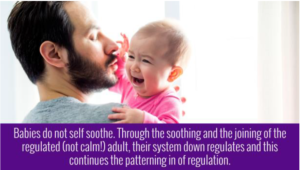Dear Director,
Signed, tired of babying the big brother
Dear Tired,
Of course the three-year-old is developmentally on target-in spite of drug and violence exposure prenatally, he has lived since birth in a calm, healthy, emotionally stable environment, which has allowed his brain to learn how to self-regulate. And his five-year-old brother, in spite of two years of exposure and neglect, had enough neuroplasticity to learn from you and your wife, through action and example, as well as with the help of the play therapist, to be better self-regulated. This means that his brain is able to, and is changing to be more capable of managing his own emotions through words and calm actions. Besides, when he came to you as a needy two-year-old, the things that parents can do to co-regulate with a child (holding, rocking, skin-to-skin contact, calm response, narrating the child’s experience in words, using feeling words to express for them, and so forth) are easy and fun when parenting a toddler. So through your actions, you helped him go back to being that baby, and helped his brain redevelop with a better self-regulation style. He is well on his way to secure attachment through your parenting.
learn how to self-regulate. And his five-year-old brother, in spite of two years of exposure and neglect, had enough neuroplasticity to learn from you and your wife, through action and example, as well as with the help of the play therapist, to be better self-regulated. This means that his brain is able to, and is changing to be more capable of managing his own emotions through words and calm actions. Besides, when he came to you as a needy two-year-old, the things that parents can do to co-regulate with a child (holding, rocking, skin-to-skin contact, calm response, narrating the child’s experience in words, using feeling words to express for them, and so forth) are easy and fun when parenting a toddler. So through your actions, you helped him go back to being that baby, and helped his brain redevelop with a better self-regulation style. He is well on his way to secure attachment through your parenting.
But an angry, sullen, parentified six-year-old; because I bet he was both angry and sullen and parentified; is a lot harder to connect with. We see them, and we expect them to be six; you know, kids who read and ask why questions and can do floor puzzles and use works to express themselves. Meanwhile, his brain may never have had the opportunity to co-regulate with an emotionally available adult. If the parental experience he had at one and two and four was similar to when he came into foster care, he never got what either of his brothers had: the chance to learn how to self-regulate. Instead, he had to meet his own needs, including his emotional needs, and then those of his little brother, all before he came to your house. And when he arrived, I bet he was none too happy to give up his “place” in society, that of protector of his brother. I even suspect that his developing sense-of-self was that of “who needs adults, I can do it all, I am powerful and strong and adults are not to be trusted, but I am.” So, angry at loss of his job, sullen because he cannot understand, and parentified as his basic survival skill.

What he needs is the commitment from one, or both, of his parents to unconditionally love and accept him, and the ability to go back and have you do the “baby brain” parenting he needs when he needs it. He can be rewarded for small acts of big-brotherness, like getting a diaper or “watch them for a minute while I go to the garage for paper towels,” but no more parenting than that. He also needs you to parent the age of the child you see. When he has that tantrum, respond like you do to his little brother, which is with calm words, narration of his feelings, and no-holds-barred love. Parent the age he acts. If there is a therapist who specializes in attachment in your area, or a support group, they may be able to help with other ideas. Check out these ideas. So, on a good day, reward the maturity of the nine-year-old, and on a bad day, parent the little boy who was not cared for, so that his brain can grow. Co-regulate with him so he can internalize the message that he is worthy, and then learn to self-regulate.





